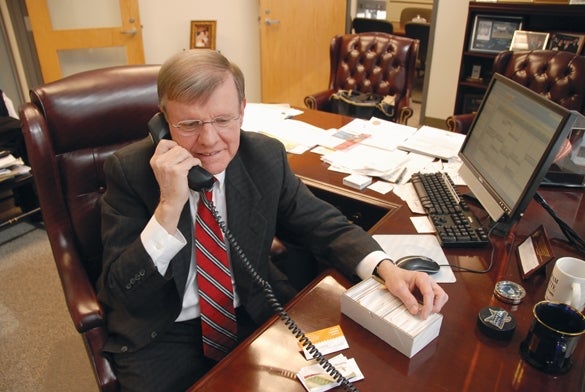He worked for IBM and launched an Internet start-up company, but when it comes to managing his vast collection of business contacts, Richard B. Kennedy, president and CEO of the Worcester Regional Chamber of Commerce, is decidedly low-tech.
He doesn’t have a Blackberry chock full of names, numbers and e-mail addresses. He doesn’t depend on his office e-mail program or LinkedIn to keep his contacts organized. Instead, there’s a collection of boxes in the top left-hand drawer of his desk that contain literally thousands of business cards.
“A lot of friends of mine would argue that the technology should’ve gotten the best of me, but it hasn’t…IBM must be turning over in their graves,” he said.
Of course, Kennedy isn’t alone. While millions are joining online social networking sites like LinkedIn to manage their contacts, there are still plenty of local executives who find the traditional business card the most effective and quickest way to stay connected.
Archaic Systems
Joining Kennedy with his personal take on the old-fashioned rolodex is Gail Randall, special projects officer at the Greater Worcester Community Foundation, who relishes the simplicity of her rolodex while acknowledging that she’s stuck with it out of necessity.
Randall is part of a program that brings resources to nonprofit leaders throughout New England, and another similar program with the national Nonprofit Support Center.
“I collect their cards and these people become friends. They’re in there for life, and it’s just so simple,” she said. The foundation does maintain a computer database that Randall does have to use, but she finds the electronic manager a bear. “Because I don’t use Outlook, it just takes so long to access the database system,” she said.
Traditionally, many of the foundation’s clients did not have e-mail and could not be reached by anything other than a phone call or a visit, Randall explained.
“The only problem with the rolodex is you can’t take it with you,” Fletcher said. “But if you’re in the office, it’s simpler. It’s not such an anachronistic vehicle other than it takes up a little extra space on your desk, and if (a computer or other technology) goes down, you don’t lose your address space.”
For Kennedy, his low-tech system of business cards and phone directories works just fine, and on many occasions, his system has proven more efficient and faster than today’s high-tech “solutions.” It just takes up more space – but at least it doesn’t add to the electricity bill.
“I meet a tremendous number of people,” Kennedy said. “I might walk out of a ‘business after hours’ with five or 10 cards. Some, I may want to follow up with, some just want to say hello.” About every six months, Kennedy goes through his collection of “active” business cards and asks himself, “Why do I have this? Is there any need to have this in anything other than a passive file?”
The boxes of business cards in the desk drawer are the “passive file.” The cards there are arranged “not alphabetically, more chronologically,” Kennedy said. The more “active” contacts are kept either on his desk or in a binder.
And while businesses that have gone “paperless” and tech-savvy networkers probably aren’t going to drop their electronics in exchange for Kennedy’s system, they could learn a thing or two from the Worcester Polytechnic Institute graduate’s method.
As Kennedy worked in 2000 to launch eGLOBALCHEM, an information network site for supply chain executives in the chemical industry, his business partner relied heavily on his Microsoft Outlook e-mail program to collect and organize contact information.
“Things like that were his Bible,” he said. “But we’d go make a call, and I’d look through my cards” beforehand. Usually, Kennedy would have three contacts before his partner had a chance to look up.
“The cards are more readily at hand,” he said. “My archaic system seems to work for me. I think we’ve lost the art of going and meeting people and talking to them and doing it one-on-one and not having a Blackberry in-hand. Sometimes I wonder if they’re paying attention.”
One of those to embrace the latest in technology locally is Warner S. Fletcher, an officer at Worcester law firm Fletcher Tilton & Whipple. He, along with most of the attornies at the firm switched from using Blackberrys to stay connected to Apple’s much-lauded iPhone.
New Tricks
“All my numbers are on my iPhone, and for scheduling purposes, if I’m out of the office and you want to set up a meeting with me and two other attorneys, instead of making 18 phone calls, my secretary can check our schedules and set it up,” Fletcher said of his handheld device.
That’s an improvement over the way Fletcher handled contact information in the old days. “I never used a rolodex and I probably should have. I had a sheet with numbers on it and I probably would’ve spent a lot of time looking for your number if I had to call you.”
Watch as Richard Kennedy talks about the importance of business cards.

